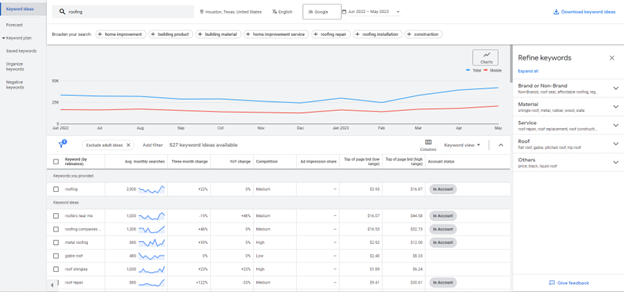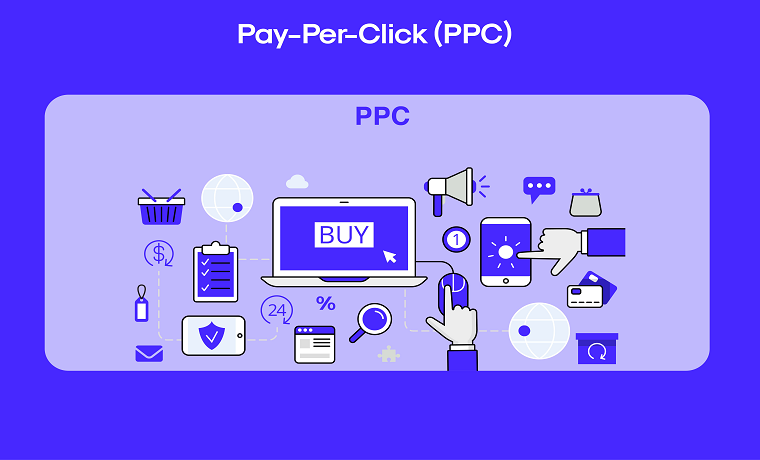The modern digital marketplace is one of the most competitive places, even for businesses like roofing. With an excessive number of possible customers actively searching online for services, finding effective techniques to connect with them can be challenging.
One such technique that has proven its worth in the marketing environment is Pay-Per-Click (PPC) advertising. It’s a mandatory step in the firm marketing strategy of 87% of small businesses due to its proven effectiveness.
Understanding the Basics of PPC
PPC advertising is easy to understand. It relies on placing your business in front of potential customers – people who already search for roofing services online. That’s the essence of this strategy, and it depends on much more than targeting.
Sure, CPC can add some precision if you do a lot of data-based targeting or bid enough to reach specific high-value consumers, but that doesn’t make PPC any less effective. The simple truth is that it works much better when the prospect has shown a clear interest in what you have to offer.

Keyword Research and Strategy
Keyword planning is the foundation of an effective PPC campaign. Keywords are the keywords that prospective customers use while engaging in online shopping for products or services. The pull of PPC lies in leveraging the power of those keywords to your advantage. If you want to effectively reach your target audience through your PPC ads, then it is critical to conduct proper research and properly incorporate the right keywords into them.
This isn’t about just choosing popular keywords; it’s about understanding your customers’ search habits and meeting them in their online journey.
Google Keyword Planner
The role of keyword research in PPC cannot be understated. The good news is there are tools like Google Keyword Planner that make this task easier.
This free tool is designed to help you find and select the right keywords for your PPC campaigns. It provides crucial insights such as historical search volume, average cost-per-click (CPC), and suggested bid estimates for each keyword. These insights not only guide your keyword selection process but also help you budget your campaigns effectively. By understanding how much each keyword could cost you, you can ensure a high return on investment and prevent overspending.

Keyword Spend & Budget Allocation
Managing your budget is a critical aspect of roofing PPC advertising. When you bid on keywords, you’re effectively competing against other advertisers for a spot in the search results. This bidding war can quickly become expensive if not properly managed.
Setting a budget for your keyword spending ensures that you don’t overspend, keeping your PPC campaign organized and focused. With a budget in place, you’re forced to make sure your keywords are targeted and effective, thus ensuring the money you spend is more likely to bring in valuable leads.
Smart Bidding in Google Ads Google
Smart Bidding is an automated bidding strategy that uses machine learning to optimize your bids for conversions. It’s designed to streamline the bidding process by taking the guesswork out of the equation.
Instead of constantly monitoring and manually adjusting your bids, Google Smart Bidding automatically does it for you. As it’s powered by machine learning, this tool becomes smarter over time, continuously improving your results. It’s a powerful way to increase efficiency and improve the performance of your campaigns.
Performance Max Campaigns
One of the newer additions to Google’s suite of advertising tools is Performance Max campaigns. These campaigns use smart bidding to optimize your performance across all of Google’s channels.
They’re not just about maximizing ad spend; they’re about achieving your goals across multiple channels. Performance Max Campaigns are highly goal-oriented, allowing you to customize your campaigns to work toward your specific business goals. Plus, they allow you to reach all of Google’s ad channels with a single campaign, making the most of your resources.
The Importance of Negative Keywords
In the realm of PPC advertising, it’s not only about the keywords you want to target but also about the ones you want to avoid, termed as negative keywords. These search terms are irrelevant to your business and can lead to unfruitful clicks if your ad appears for them.
For example, if you’re a roofing company, you might want to add “DIY roof” as a negative keyword to prevent your ad from being shown to people looking to fix their roofs on their own. Carefully choosing your negative keywords can save you a lot of money by avoiding wasteful spending on irrelevant clicks, thus reducing your cost-per-click and getting more value out of your PPC budget.
Tracking and Reporting for PPC
No PPC strategy can be successful without proper tracking and reporting. Contrary to the “set it and forget it” approach, PPC campaigns require constant monitoring and adjustment.
By effectively tracking and reporting on your PPC ads, you can see what’s working and what’s not, allowing you to adapt your strategy accordingly. This level of insight helps you understand which keywords are converting and where you should focus your efforts. Thankfully, the majority of businesses find it easy to track the effectiveness of their PPC campaigns with the right tools and understanding.
Understanding Google’s Quality Score
Quality Score is another key factor to consider when assessing the effectiveness of your PPC strategy. This number represents how relevant your ad is to the keywords you’re targeting and how well your landing page aligns with those keywords.
The higher your Quality Score, the more aligned your ads are with what potential customers are looking for. It’s an integral part of ensuring that your PPC strategy is effective and that you’re getting the most out of your investment.
Conclusion
Navigating the world of PPC advertising can seem daunting, especially with the array of tools and strategies at your disposal. However, with a strategic approach rooted in understanding your target audience, diligent keyword planning, effective budget management, and continuous tracking and optimization, PPC can become an indispensable tool in your marketing arsenal, amplifying your online presence and driving valuable leads to your roofing business.
PPC advertising is much more than just a marketing strategy; it’s a tool that, when wielded correctly, can help roofing businesses connect with potential customers in a highly targeted and effective way. The world of digital marketing is always evolving, and PPC advertising offers a dynamic and adaptable way to stay ahead of the curve and continue to grow your business.
So, are you ready to harness the power of PPC to drive more leads to your roofing business? The potential is there; all it takes is a well-planned and well-executed strategy to tap into it.

